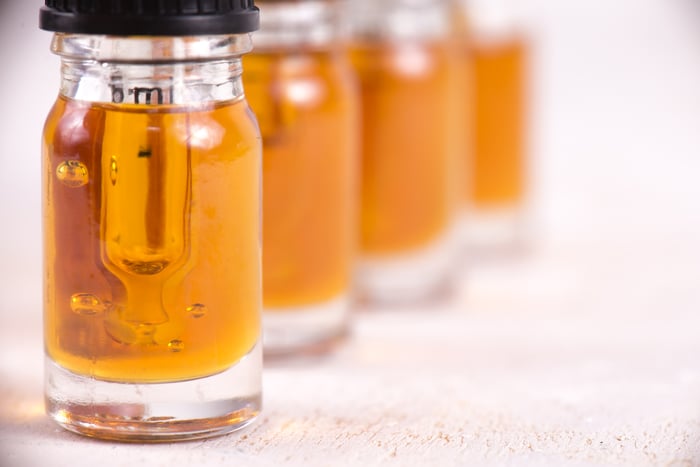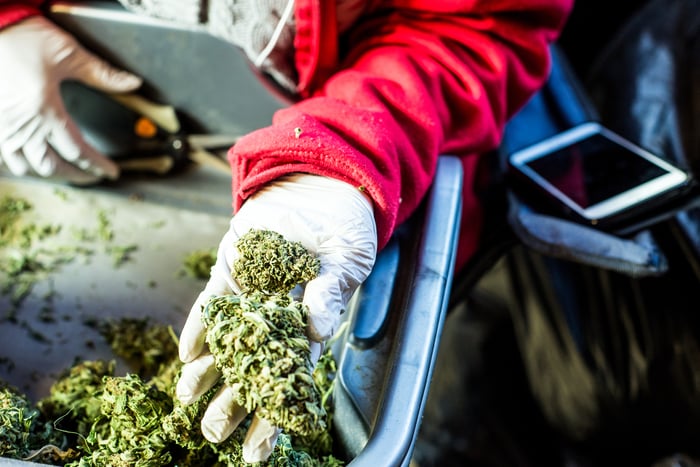This has been a truly unforgettable year for the North American marijuana industry. The big news, as you're well aware, is the legalization of recreational cannabis in Canada. Once growers have had time to get their operations up to scale, this is an industry that could be generating upwards of $5 billion in added annual sales (i.e., added atop what it's already bringing in via medical weed sales and exports to foreign countries where medical marijuana is legal).
Its neighbor, the U.S., has seen two new states -- Utah and Missouri -- join the ranks of those that have legalized in some capacity. Not to mention, residents of Michigan recently voted to become the 10th state to legalize adult-use pot, and in June the U.S. Food and Drug Administration approved the very first cannabis-derived drug. It's been a busy, but very successful, year for the cannabis industry.

Image source: Getty Images.
Everything you need to know about Cronos Group's Q3 report
But as the marijuana industry matures before our eyes, investors' attention is turning away from promises and toward tangible results. In other words, they're analyzing marijuana stock earnings reports with a fine-toothed comb. And it just so happens that one of the most polarizing pot stocks, Cronos Group (CRON -1.20%), reported its third-quarter operating results earlier this week. Moving beyond simply the headline numbers, here are the 10 things you absolutely must know about Cronos' most recent performance.
1. Sales growth is impressive, albeit revenue is minimal
To get the obvious out of the way, Cronos Group's third quarter featured a surge in revenue of 186%, with sales increasing to 3.76 million Canadian dollars. This also came on the heels of a 213% improvement in kilograms sold year over year to 514 kilos. But, when taken as a whole, Cronos' nearly CA$3.8 million in sales is a drop in the bucket to its $1.5 billion market cap. Considering that its Q3 report only factors in sales up to Sept. 30, 2018, we'll have to wait another quarter before we see any genuine impact from the recreational legalization on Oct. 17.
2. Oils as a percentage of sales is on the rise
On the bright side, even though Cronos reported a minimal amount of sales during the quarter, 29% of its revenue was derived from high-margin cannabis oils. Oils are primarily targeted at medical marijuana patients. The thing is, oils have a much higher price point and considerably better margins than dried flower. Growers that take the time to develop a line of cannabis oil products will be doing themselves and their shareholders a favor by minimizing the possibility of dried flower commoditization in the future.

Image source: Getty Images.
3. A strong focus on alternative cannabis products
Of course, Cronos Group isn't simply satisfied with focusing on oils production. It's been finding new and innovative ways to expand its revenue stream beyond dried cannabis flower. During the quarter, arguably the most exciting announcement was the partnership between Cronos and Gingko Bioworks to produce cultured cannabinoids through fermentation that are identical to cannabis plants at commercial scale. This should lead to high-margin sales in a very niche portion of the cannabis industry.
Subsequent to the end of the third quarter, Cronos also entered into a sponsored research agreement with Technion in Israel to explore the use of cannabinoids to treat skin disorders and regulate skin health. This push into alternative cannabis products will be important for operating margins if dried flower prices do decline in the years that lie ahead.
4. A major project will be complete by the second half of 2019
Another important piece of information divvied out in the company's third-quarter operating results press release was the news that its joint-venture greenhouse project in Ontario (Cronos GrowCo), spanning 850,000 square feet, should be completed by the second half of next year. Once running on all cylinders, this greenhouse is expected to produce 70,000 kilograms per year, which, according to my estimates, would pretty much double Cronos' peak production.
5. Branding has come into focus
With legalization having come and gone in Canada, most growers have moved beyond the capacity expansion stage and are now focusing on branding and marketing. During the third quarter, Cronos Group introduced its second recreational pot brand, Spinach. With its premium brand COVE and newly launched Spinach, Cronos is angling to engage adult consumers and forge long-term attachments that drive those consumers back to its brands.

Image source: Getty Images.
6. Supply deals are also important
For cannabis growers, supply deals are the bread and butter that make the world go round. The more long-term supply deals that are in place, the less marijuana stocks have to scramble to find a home for their production. During the quarter, Cronos announced that it had entered into an agreement with Cura Cannabis Solutions whereby Cura would purchase at least 20,000 kilograms of pot per year from Cronos GrowCo for a period of five years. That's nearly 30% of Cronos GrowCo's peak production that's already accounted for, assuming Cura received all of its necessary licenses from Health Canada.
7. International sales aren't as strong as you'd expect
For as much focus as is placed on Canada's legalization, the overseas market for medical patients is potentially even more robust. Yet, at least in the early going, international sales growth has been pretty tepid. Keeping in mind that Cronos isn't producing a lot of cannabis yet, the company only recognized CA$564,000 in international sales in Q3. That's not even double the CA$316,000 recognized in the year-ago quarter.
Even more of a headscratcher is the fact that lower-margin dried cannabis, not oils, comprised over 90% of international sales. Since international revenue is geared to medical marijuana patients, this is a bit disappointing.
8. The company may need additional capital raises
Investors should be aware that Cronos Group may need to turn to a dilutive bought-deal offering relatively soon in order to raise additional capital. To be clear, Cronos ended the quarter with CA$41.5 million in cash and cash equivalents, and has more than enough capital to meet its current liabilities. However, the company burned through CA$48.1 million during the third quarter, and things like greenhouse projects and alternative product development aren't cheap. At the rate Cronos is going, it'll likely need a capital raise sooner rather than later.

Image source: Getty Images.
9. Cronos isn't close to being profitable on an operating basis
Although marijuana growers like Cronos Group have had fair-value adjustments related to their biological assets work in their favor in recent quarters, it's important to understand that this is a company that's nowhere near profitability on an operating basis. In its recently ended quarter, it generated CA$2.07 million in gross profit, after cost of goods sold is accounted for. However, Cronos also racked up just shy of CA$7 million in operating expenses, which would have led to an almost CA$4.9 million operating loss. It'll be some time before Cronos has any shot at recurring profits.
10. Dilution continues to be a long-term concern
Last but not least, the dilution bug strikes again. With bought-deal offerings being the most common way pot stocks raise capital, and deals being financed in large part by common stock, the outstanding share count for most marijuana stocks has ballooned. Cronos is no exception. Having begun the calendar year at 149.4 million shares outstanding, Cronos ended September with 178.7 million. Mind you, this doesn't take into account the 12.8 million stock options or 25.5 million warrants outstanding at the end of the third quarter. This steady increase to the company's share count is going to make it tough for Cronos to produce a meaningful per-share profit.





